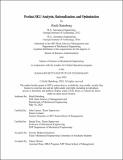Product SKU Analysis, Rationalization, and Optimization
Author(s)
Hatteberg, Heidi
DownloadThesis PDF (8.033Mb)
Advisor
Frey, Daniel
Carrier, John
Terms of use
Metadata
Show full item recordAbstract
Optimizing a portfolio product mix to balance customer demand and company strategy is an ongoing challenge for various industries, often resulting in product proliferation. LFM Capital, a private equity firm, acquired IronCraft, a tractor attachment company in Eastern Tennessee, in 2021. Since its initial founding in 2014, IronCraft has faced rapid growth and change which has challenged them to meet high market demands, resulting in a significantly large product portfolio of roughly 1,000,000 variations in Stock Keeping Units (SKUs) of both manufactured and sourced products. In addition to managing such a large portfolio, the current mix also increases variability and complexity to its manufacturing operations. This thesis employs IronCraft as a practical example to perform a SKU rationalization project using a deterministic model for strategic decision making which resulted in a “Standard Offerings List” of just 230 product offerings (130 manufactured by IronCraft and 100 sourced through its partner company, CID). When modeled alongside future orders for the 2024 pre-season, this list fulfilled 75% of those orders, proving that the pruned product mix can meet demand (assuming upselling of new products). These offerings were then a focus for production improvement and Lean/5S efforts to reduce safety hazards, reduce setup/changeover times by 80%, improve cycle times for assembly by 10-15%, establish a metric tracking system, and derive quality metrics from the existing system. All tools developed and implemented through this thesis were designed to drive productivity, growth, and integration within IronCraft.
Date issued
2024-05Department
Massachusetts Institute of Technology. Department of Mechanical Engineering; Sloan School of ManagementPublisher
Massachusetts Institute of Technology